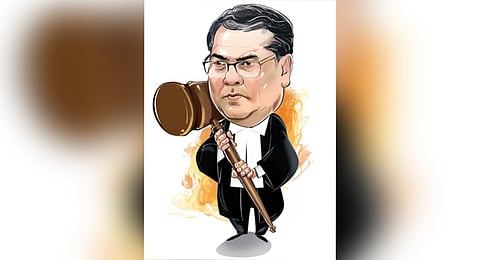When justice runs in veins
For Justice Sanjiv Khanna, who took oath as the 51st Chief Justice of India on November 11, sticking to the letter of the law and living up to its spirit have been like walking on a razor’s edge at times. But in a legal career spanning over four decades, he has often done it with a rare conviction.
His landmark judgements and observations in court bear witness to that. Also testifying to his honesty, acumen and hard work are some of those who have worked alongside and under him.
A lawyer who has practised as an advocate-on-record (AOR) under Justice Khanna remembered: “In one case, he had already taken his professional fee as a lawyer after winning the case. Yet, his client gave him an envelope containing cash and quickly turned on his heels.”
“When informed, Khanna rushed downstairs from his first-floor office, caught hold of the client and returned the packet, firmly telling him that he had already received his professional fees as a lawyer and didn’t need more,” the AOR said.
Another observation about his professionalism related to CJI Khanna’s father, Justice Dev Raj Khanna, a former judge of the Delhi High Court. The senior Justice Khanna’s passing came just a few weeks before his son was elevated to a high court judgeship in 2005. “During those weeks, in spite of the tragedy his father’s death, Justice Khanna went through his cases files, briefings and prepared arguments for his client. Such has been his honesty and dedication to work,” said the AOR.
Another source close to Justice Khanna said that his father and mother Saroj Khanna, a professor of Hindi at Lady Shri Ram College in Delhi, wanted their son to be a chartered accountant. Justice Khanna, however, was inspired by his uncle Justice Hans Raj Khanna of the Supreme Court, who had propounded the basic structure doctrine in 1973 and tried to uphold civil liberties during the Emergency. “He always considered his uncle an idol,” the source added.
A testament to Justice Khanna’s hard work goes back to 2003-04, when he was preparing a double-tax avoidance agreement case for his clients. The AOR recalled, “He worked for two-three nights straight tirelessly with Soli Sorabjee.”
Retired Justice Arijit Pasayat, a former colleague at the Delhi High Court and the Supreme Court, expressed deep appreciation for Justice Khanna’s expertise in constitutional, taxation, civil and arbitration matters.
Born on May 14, 1960, Sanjiv Khanna completed his schooling at Delhi’s Modern School in 1977 and his graduation at St Stephen’s College in 1980. He studied law at the Campus Law Centre, Delhi University.
He began his legal career in 1983 and initially practised at the district court in the capital’s Tees Hazari complex. In 2004, he was appointed a standing counsel for civil matters for the National Capital Territory of Delhi and, in 2005, earned his first judgeship.
Not long after, in 2006, he became a permanent judge. During the stint he served as chairman of the Delhi Judicial Academy and Delhi International Arbitration Centre too. His elevation to the Supreme Court came in January 2019.
In SC, Justice Khanna has been associated with landmark rulings on the abrogation of Article 370 and was part of the five-judge bench that declared the electoral bonds scheme unconstitutional.
He has also been instrumental in many consequential judgements including granting interim bail to former Delhi chief minister Arvind Kejriwal that allowed the politician to campaign during the 2024 Lok Sabha elections.
In another important ruling, Justice Khanna emphasised that delays in proceedings could serve as a valid ground for granting bail under the Prevention of Money Laundering Act. Not just in this case, but he has emphasised the right to bail as being inviolable in many other observations too.
His six-month tenure as chief justice promises to be hectic, with critical issues such as the sedition and marital rape pending before the Supreme Court. In front of his bench will be cases such as the constitutionality of the triple talaq law and the validity of Bihar’s caste-based survey.
By all measures, though the current CJI’s tenure will be much shorter than his predecessor’s, it will be packed with cases just as consequential.

